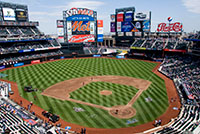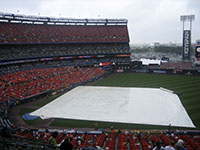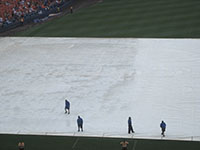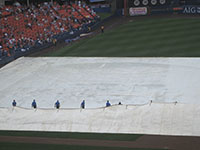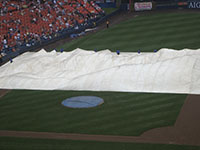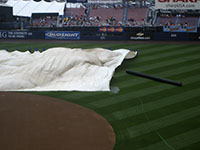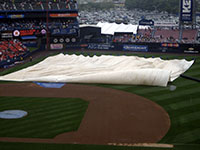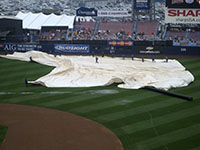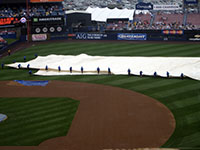I promised Wing that I would write about the World Series to date. And since I'm about to start playing Civ 4, I better do it now or I'll never do it.
I've watched most of the Series so far and am a bit underwhelemed, though that doesn't take away from the refreshment of watching a championship series between two teams that, all in all, I don't mind one bit. In my mind, the series has been markes so far by poor umpiring benefiting the Sox (what else is new?), meaningless comebacks, one really long game, and home runs by unlikely suspects (Podsednik, Blum). There haven't been any dominating pitching performances; there haven't been any inspiring hitting accomplishments. So it's been enjoyable, but I don't think I'll remember it for years to come.
Another Blown Call
I suppose that I must commit to electronic paper my thoughts on the latest blown call. Given a choice between ruling a foul ball and a hit batsman, the foul ball clearly makes for a more conservative call. Thus an umpire—being only human—must be convinced that a ball hit a btter to call it as such. Home-plate umpire Jeff Nelson just flat out blew it. And once again, the White Sox capitalized on their fortune as Konerko blasted a grand slam on the very next pitch. It's becoming a typical sequence with the White Sox this postseason:
- Egregious blown call.
- Capitalize.
- Win.
- Profit.
My natural instinct is to root against the White Sox because of these blown calls. It's not their fault, obviously, and they have done a tremendous job in siezing the opportunities presented to them. But it's
just not fair and when all else is (approximately) equal, I tend to prefer the team which is on the short end of the fair scale.
After the game, Jermaine Dye admitted that the ball hit bat rather than body. The stark nature of the admission led me to engage in several conversations about whether the sportsmanlike behavior would have been for Dye to correct the umpire's call when it happened. No one expected Dye to correct the call. Everyone agrees that it's a cold day in hell when a professional athlete corrects a call that went in his or her favor. But I was surprised to find that most people I spoke with thought that it would have been sporting of Dye to correct the call. I thought about this, and though I may be conflating sportsmanship with morality and ethics, I do not think that it would have been right for Dye to correct the umpire? Why? Dye has a whole team relying on him to help them win the World Series, and to aid the opponent—even in the guise of enforcing the rules— would be to momentarily turn his back on his team. (Even if you consider a strict interpretation of sportsmanship's definition as fairness in following the rules of the game, one could argue that just as the rules make clear what happens when the ball hits the bat, the rules charge the umpire with determining what has happened before applying the correct rule.)
More on the Let Down Hit
Now that we've had our primer on let down hits, the World Series has been gracious enough as to show us some subtleties surrounding the let down hit. Consider this Let Down Hits 202. First, in Game 1 we learned an advanced technique for avoiding the let down hit. With the bases loaded and only one out in the bottom of the 5th, Astros pitcher Wandy Rodriguez paced behind the mound, seeking a solution to his dilemma. He knew he could get the batter, AJ Pierzynski, out, but then he would leave himself susceptible to a let down hit. But with the bases loaded, not retiring Pierzynski would score at least one run anyway! What to do? Rodriguez figured out the perfect solution: coax the batter to hit into a double play! So, lesson one from the World Series: a let down hit can be avoided by getting the two or three needed outs all on the same play.
Now, fast forward to the pivotal 14th inning in Game 3. "But wait a minute, Lee," you say. "The White Sox never had MOTLOTT in the 14th inning!" Indeed you are correct, my student, but look cloesly at Geoff Blum's home run. What happened before that fateful blow? Why, Ezequiel Astacio committed the cardinal sin of allowing the leadoff batter to reach base (40-50% chance of that runner scoring), but then negated that entirely when Konerko hit a hard ground ball into a 5–4–3 double play. The Astros and their fans let out a collective sigh of relief, and then—bam!—the biggest of all let down hits followed. Lesson two from the World Series: not all let down hits are linked to MOTLOTT situations.
Professional Hitter
Before Scott Podsednik could both win a game and double his season's home run total with a walkoff home run in the bottom of the ninth to win Game 2 for the White Sox, the Astros first had to stage an improbable two-run comeback in the top of the ninth against Bobby Jenks. The key, game-tying hit in their rally came as a single by pinch-hitter Jose Vizcaino, whom the broadcasters described as a "professional hitter." Now, last century, Jose Vizcaino spent several years on the Mets, and I despised him. In my casual observations, all he ever did was hit ground balls to the shortstop, often for double plays. My Dad always disagreed, claiming that Vizcaino was a solid hitter. I'd tease him when Vizcaino grounded out (all the time!) and Dad wouldn't let me forget whenever he got a key hit (rarely). So when Vizcaino tied the game in the ninth, I immediately knew that were Dad alive, the phone would soon be ringing with an "I told you he was a great hitter!" waiting on the other end of the line.
As an aside, I just grepped my saved mail for mentions of Vizcaino and came up with this snippet between Dad and me during the 2000 Mets vs. Yankees Subway Series to illustrate my point. Vizcaino had had the game winning hit for the Yankees in Game 1 of that World Series, prompting this exchange after Game 2:
Dad:And we didn't talk about your favorite in game 1---Jose VIZCAINO!
> I always told you he was good. Now he comes back to hurt us!
Lee: I was convinced after game 1 that this was the Universe's way of mocking
me. Happily, he put up a big 0-for-4 leading off tonight.
It seems little has changed. As I write this entry, Vizcaino pinch hits in a key situation for the Astros in the bottom of the eighth inning, and promptly (and weakly) grounds out to shortstop. Looks like Dad and I were both right.
What's in a Name?
The Astros have Jose Vizcaino while the White Sox have Luis Vizcaino (no relation). The Astros have Adam Everett while the White Sox have Carl Everett (no relation). Just sayin'.
